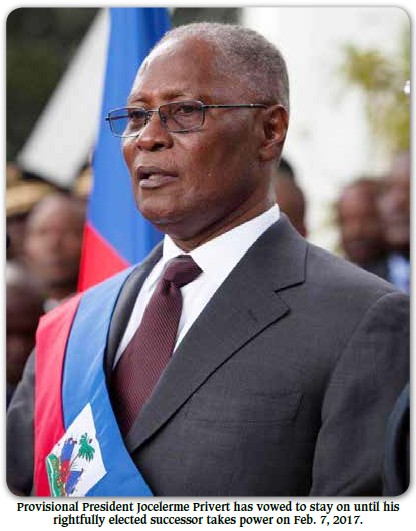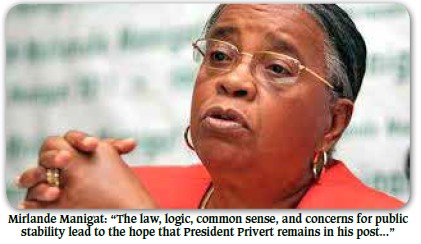|
 Haiti’s
Chamber of Deputies President Cholzer Chancy and Senate
Vice President Ronald Larèche had summoned Haiti’s
deputies and senators for a Jun. 21, 2016 joint session,
known as a National Assembly, to decide on the fate of
Provisional President Jocelerme Privert, who became head
of state through a
political
accord signed
Feb. 5, 2016.
The accord says
that the "mandate of the Provisional President is up to
120 days from the date of installation,” which was Feb.
14 until Jun. 14. “Where appropriate the National
Assembly will take the necessary measures."
As the legislators
gathered for the vote, thousands of demonstrators
gathered outside the Parliament voicing their support
for Privert. Ultimately, the National Assembly was not
held because the parliamentarians were frightened by the
anger and size of the street protests, saying their
“security was not guaranteed because of demonstrators
throwing rocks at the Legislative Palace.”
In fact, the
National Assembly gambit was pure bluff. The
parliamentary partisans of former President Michel
Martelly, who stepped down in disgrace at the end of his
term on Feb. 7, knew they had almost no chance of
dislodging Privert. He has vowed to stay on until his
rightfully elected successor takes power on Feb. 7,
2017, according to
the calendar
of the new Provisional Electoral Council (CEP).
In the lower house,
there are only 92 deputies (questionably elected in the
2015 elections) of the 119 seat chamber, and 53 have
already vowed to support Privert staying on. Meanwhile,
Privert has the support of 12 of the 22 senators in the
30 seat body. Any motion to oust Privert would have to
pass both houses.
Just last week, on
Jun. 13 when the 50th
Legislature reconvened, the National Assembly
also failed
to take a vote on Privert
because his opponents knew they would fall short.
Meanwhile, the
leading presidential candidates’ front known as the
Group of Eight (G8) formally disbanded following the
pull-out of Jean Henry Céant (Renmen Ayiti), who is
unhappy with Privert’s staying on. Then four other
former candidates – Sauveur Pierre Etienne (OPL), Eric
Jean Baptiste
(MAS), Mario
Andrésol (Independent), and Steven Benoît (Konviksyon) –
threw their support behind LAPEH’s Jude Célestin, who
had been the candidate of former President René Préval’s
party in 2010.
Célestin and Moïse
Jean-Charles (Pitit Desalin) are both arguing that the
new presidential elections should be limited to just the
three or four leading candidates of the Oct. 25, 2015
first-round, which has now been annulled. (Originally,
there were 54.) Critics of this proposal say the
fraudulent election cannot be partially scrapped, with
front-runners cherry-picked out.
Both candidates
also argue that Jovenel Moïse, the presidential
candidate of Martelly’s PHTK, should be disqualified
from participating in the new election scheduled for
Oct. 9 because he allegedly engaged in massive fraud.
Jovenel Moïse supposedly placed first in the first-round
with 33% of the vote.
Great debate has
surrounded the Feb. 5 Accord, about whether it is
“legal” and “Constitutional” or not. Constitutional
scholar Mirlande Manigat, who placed second in the 2011
presidential run-off, gave an exhaustive and
well-reasoned assessment.
“ The election of
Senator Privert references two texts,” she said. “On the
one hand the Tripartite Agreement of February 5, which
is a political agreement without constitutional and
legal basis, but it has been widely accepted as a kind
of desperate lifeline in the confusion and concerns at
that time, without a necessary review of possible
implications; [the accord’s] language, especially the
famous grammatical expression ‘where appropriate’ [le
cas échéant],
is currently feeding commentary and extrapolations. The
second [reference] is the second paragraph of Article
149 of the 1987 Amended Constitution. By chance in legal
drafting, they both mention the 120 days that could be
the basis of reference, but it should be emphasized that
our constitutional and legal traditions manipulate time,
and they often include no references but formal dates
that are rarely observed as they usually come up against
the tyranny of events. This is what is happening in the
current debate."
After a long analysis of Haitian legal history and
recent Constitutional changes, Manigat concluded: “So
the law, which in this instance is strictly applied,
logic, common sense, and concerns for public stability
lead to the hope that President Privert remains in his
post to oversee the organization of elections until
their conclusion on Feb. 7, 2017. "
|